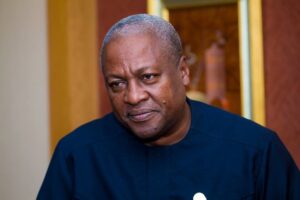
Bernard Quayson (IT-Specialist)

INTRODUCTION
Former President John Dramani Mahama promised to review the constitutional provision that prevents Ghanaians with dual citizenship from holding political positions in the country. He expressed his belief that such a law should not persist in the existing framework as it negatively impacts the nation’s human resources and should not be tolerated any further. He also assured that when NDC comes to power, they will clarify the constitutional provision that compels them to give up their foreign citizenship before they contest elections.
These statements were made during his address to NDC supporters on Sunday, May 7, 2023, in Tamale. According to the former president, amending the law would allow Ghanaians with dual citizenship living abroad to take up leadership roles and offer their expertise in developing the country. This means a person born in the United States to Ghanaian parents and holding both U.S. and Ghanaian citizenship can contest for presidential and parliamentary positions and other public offices.
It has also been argued that countries such as Ghana and Kenya have benefited from the inflow of funds from countries where their citizens hold dual nationality.
On the other hand, some argue that allowing dual citizens to hold sensitive positions could pose a risk to national security and confidentiality due to potential conflicts of interest. While dual citizenship can bring various benefits and opportunities, it can also present certain challenges when it comes to political participation, particularly in positions such as parliamentary candidacy. In this manuscript, we will explore the concept of dual citizenship, discuss the reasons behind laws that restrict dual citizens from contesting for positions in parliament, and examine the implications of such laws on political representation and governance.
Understanding Dual Citizenship:
Dual citizenship, also known as dual nationality, is a legal status that allows an individual to hold the citizenship of two countries simultaneously. It can be acquired through birth, descent, marriage, or naturalization. The laws and regulations governing dual citizenship vary among countries, as each nation determines its own stance on the matter.
To be eligible for dual citizenship in Ghana, individuals must be Ghanaian citizens by birth or descent. This includes those born outside Ghana whose parents or grandparents are Ghanaian citizens. Additionally, individuals who have acquired Ghanaian citizenship by registration or naturalization may also qualify for dual citizenship.
Ghana Dual Citizenship Law
The Dual Citizenship Act of Ghana was enacted on Wednesday, July 3rd 2002. The Citizenship Act, 2000 (Act 591), section 16 (1) states: “A citizen of Ghana may hold the citizenship of any country in addition to his citizenship of Ghana.”
The Dual Citizenship Law in Ghana governs the status and rights of individuals who hold citizenship in Ghana as well as another country. The law has undergone amendments to accommodate dual citizenship, but certain restrictions and requirements remain in place.
Under the current Ghanaian law, citizens of Ghana who acquire citizenship from another country are recognized as dual citizens. This allows them to enjoy the rights and privileges associated with Ghanaian citizenship, including the ability to hold property, work, and engage in various activities within the country.
However, there are specific provisions related to political participation for dual citizens in Ghana. The Constitution of Ghana states that dual citizens are not eligible to hold certain high-ranking political positions. These positions include the presidency, vice presidency, ministers of state, and members of parliament. Dual citizens are also prohibited from serving in the security services, such as the military and police.
Is there any benefits for dual citizens to contest elections?
Introduction
The issue of reviewing the constitutional provision that mandates the resignation of foreign citizenship before running for public office in Ghana has sparked a contentious debate. Former President Mahama advocates for creating a constitutional opening for dual citizens to hold positions such as members of parliament and the presidency. This article will primarily focus on the implications of this provision for these two key roles.
The Importance of Committed Representation:
The president and members of parliament play vital roles in the decision-making process and governance of a nation. Recognizing the significance of governing laws in a country’s success, it becomes imperative to carefully consider the individuals occupying these offices. Those who shape the laws should be fully committed to the country they represent.
Concerns about Dual Citizenship in Key Positions:
Allowing dual citizens to contest for the presidency and parliamentary seats may have detrimental effects. While individuals with dual citizenship can contribute to their represented country’s development, it is crucial to prioritize the occupants of these pivotal positions. History has shown that divided loyalties or conflicts of interest can arise when individuals attempt to serve two nations simultaneously. Wholehearted commitment to the country being represented facilitates the ability to make decisions based on its best interests.
Existing Legislation and Demonstrating Commitment:
It is important to note that the current law, Act 591 enacted in December 2000, already requires individuals to renounce their foreign nationality before running for public offices, including the presidency and parliament. This requirement highlights the dedication and commitment to serving one’s country above all else. Senator Ted Cruz’s voluntary renunciation of his Canadian citizenship in 2014 serves as an example of demonstrating loyalty and dedication to the United States.
Clarifying the Provision:
The provision in question does not prevent dual citizens from participating in elections or occupying specific public offices. It merely necessitates the relinquishment of foreign identity before assuming such positions. This requirement aims to ensure that individuals who hold positions of power are fully committed to prioritizing the country they represent, particularly during times of conflict with their foreign nationality. Preserving national security and upholding the principles of independence require that the management of the country be entrusted to its citizens rather than governed by foreigners. Challenging this provision raises doubts about an individual’s eligibility for these positions, as they should be reserved exclusively for true citizens of Ghana without conflicting allegiances.
The Need for Specific Review:
While the law is clear regarding the renunciation of foreign identity, the former president’s intentions regarding the provision’s review or clarification remain unclear. It is crucial to ascertain the specific aspect of the provision that requires attention.
Supporting Government Initiatives:
Apart from the citizenship provision, there are other policies such as the 1D1F initiative that warrant clarification and full support from both governments. The initiative aims to boost domestic production and reduce reliance on imports, benefiting Ghana’s economic development. Embracing such initiatives can be seen as a positive step forward for the country.
Conclusion:
The debate surrounding the constitutional provision requiring the resignation of foreign citizenship before contesting elections in Ghana raises questions about loyalty and commitment to the country being represented. While the existing law is clear, the specific aspect the former president wishes to review remains uncertain. Prioritizing the commitment of individuals in key positions is crucial for the success and security of the nation. Supporting government initiatives like the 1D1F program can contribute to Ghana’s progress. May God Bless Ghana.


I have been browsing online more than three hours today yet I never found any interesting article like yours It is pretty worth enough for me In my view if all website owners and bloggers made good content as you did the internet will be a lot more useful than ever before.
I’m highly flattered. Thanks.